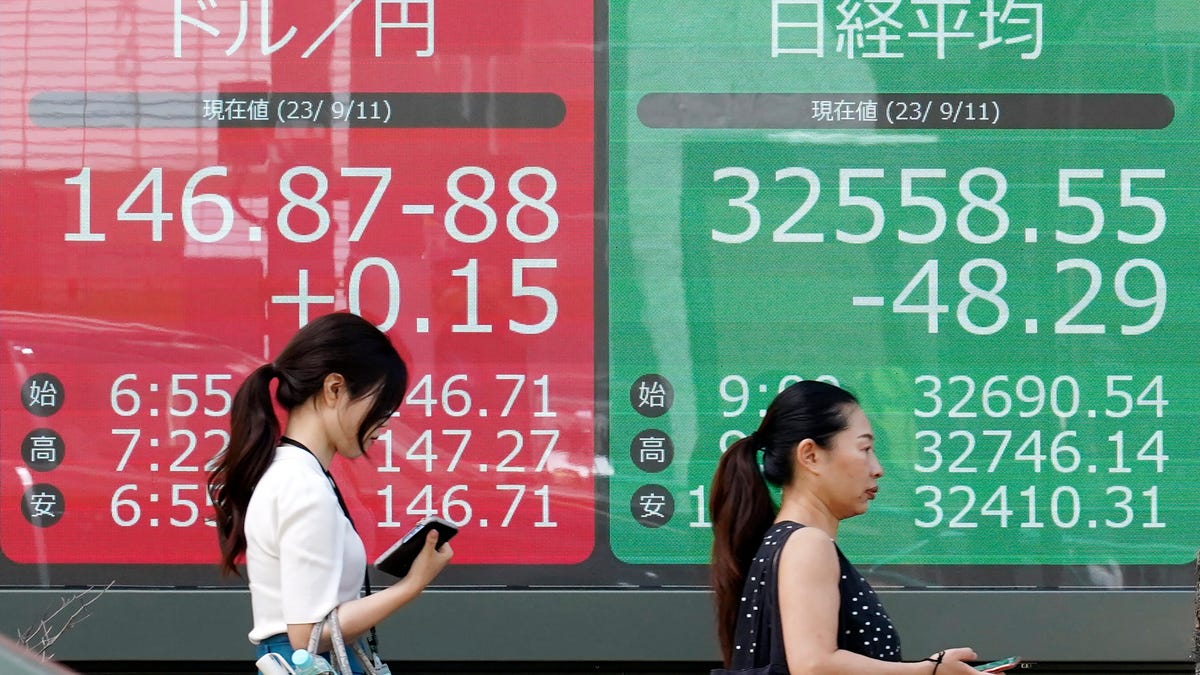Stock prices in Asia saw a majority of gains on Monday as investors eagerly awaited the release of U.S. inflation figures and China’s latest economic data.
While benchmarks fell in Hong Kong and Tokyo, they rose in Shanghai, Sydney, and Seoul.
The surge in oil prices has sparked concerns that inflation may not be declining as anticipated in the U.S. and other major economies. This potential scenario could lead to the Federal Reserve and other central banks keeping interest rates higher for a longer duration, which would have a negative impact on stock and other investment prices.
Over the weekend, China reported a slight increase in its own inflation data, suggesting that deflationary pressures, which were viewed as a sign of weakness in its slowing economy, might be easing. The government is set to release industrial output data for August later in the week.
“We expect inflation to rebound further over the coming months, as policy support drives a modest recovery in China’s economic momentum,” commented Zichun Huang of Capital Economics.
The Shanghai Composite index witnessed a 0.6% gain to reach 3,133.85, while Hong Kong’s Hang Seng experienced a 1.4% decline to settle at 17,940.08.
Tokyo’s Nikkei 225 slipped 0.2% to 32,544.04, and the Kospi in Seoul saw a marginal increase of 1 point, reaching 2,548.67.
Australia’s S&P/ASX 200 added 0.1% to 7,161.50.
China is expected to release more data this week, and an update on consumer prices in the U.S. is scheduled for Wednesday. Economists predict that it will show a 3.6% increase in prices at the consumer level compared to the same period last year.
On Friday, stocks on Wall Street registered slight gains, but still recorded their first weekly loss in the past three weeks.
The S&P 500 rose 0.1% to 4,457.49, but experienced a 1.3% loss for the week due to the shortened trading period caused by the Labor Day holiday.
The Dow Jones Industrial Average increased by 0.2% to reach 34,576.59, and the Nasdaq composite saw a 0.1% rise to settle at 13,761.53.
Smith & Wesson Brands witnessed a substantial increase of 10.8% after reporting stronger-than-expected results for the three months leading up to July. Despite the traditionally slow sales season, the company experienced a 35% increase in sales compared to the previous year.
Kroger climbed 3.1% after surpassing analysts’ expectations for the latest quarter, although its revenue fell short of predictions.
Kroger also announced a partnership with Albertsons to sell certain stores, private-label brands, and other assets in an attempt to gain regulatory approval for their proposed merger. Additionally, Kroger agreed to pay over $1.2 billion to settle claims related to opioids that could be brought against it by states, subdivisions, and Native American tribes.
Yields in the bond market remained relatively steady, contributing to a calm atmosphere on Wall Street.
Early on Monday, the yield on the 10-year Treasury was at 4.30%, up from 4.2% at the end of Friday’s trading session. The two-year Treasury yield, which is closely tied to Fed expectations, rose to 5.001% from 4.97%.
Inflation has generally been cooling since peaking at over 9% last summer, but there are concerns that the final stretch toward the Fed’s 2% inflation target may prove to be the most challenging.
The idea is that high interest rates are meant to slow down the economy and negatively impact the job market, ultimately helping to curb inflation. However, despite the highest rates in over two decades, the desired effects have yet to materialize. This situation raises the possibility of the Fed increasing rates again and at the very least maintaining them at higher levels than expected by investors.
Stephen Innes of SPI Asset Management noted in a report, “The primary driver of this underlying inflation concern has been the relentless surge in oil prices. Adding to this complex mix, the limited U.S. economic data available last week yielded some surprisingly resilient figures.”
Early on Monday, U.S. benchmark crude decreased by 49 cents to $87.02 a barrel in electronic trading on the New York Mercantile Exchange. On Friday, it had risen by 64 cents to $87.51 a barrel.
Brent crude, the international trading benchmark, dropped 17 cents to $90.48 a barrel.
The U.S. dollar weakened to 146.46 Japanese yen from 146.99 yen, while the euro strengthened to $1.0724 from $1.0714.
Denial of responsibility! Vigour Times is an automatic aggregator of Global media. In each content, the hyperlink to the primary source is specified. All trademarks belong to their rightful owners, and all materials to their authors. For any complaint, please reach us at – [email protected]. We will take necessary action within 24 hours.


